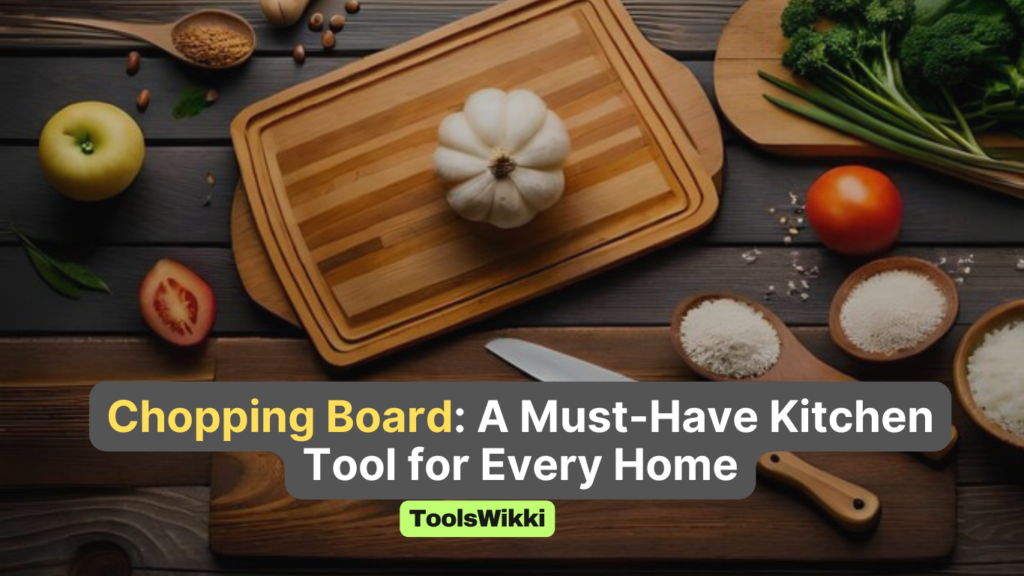A chopping board is an essential kitchen tool that makes food preparation easier and more efficient. Whether you’re slicing vegetables, cutting meat, or chopping herbs, a good chopping board protects your kitchen counters and makes cooking safer. In this article, we’ll explore the importance of a chopping board, the different types available, and tips for maintaining one.
Why a Chopping Board is Important
A chopping board provides a stable surface for cutting and preparing food. It helps keep your kitchen clean and organized by preventing food juices from spilling onto the countertop. This is especially important when working with raw meat, as it can contain harmful bacteria that should not come into contact with other foods or surfaces.
Using a cutting board also helps protect your knives. Cutting directly on hard surfaces like countertops can dull the blades quickly. A good cutting board absorbs the impact of the knife, keeping the blade sharp for longer. Additionally, it reduces the risk of accidents by giving you more control over your cutting and slicing.
ALSO READ: Is Nonstick Cookware Like Teflon Safe to Use?
Types of Chopping Boards
There are several types of cutting boards available, each with its own benefits and drawbacks. Here are the most common types:
- Wooden Chopping Boards: Wooden boards are durable and gentle on knives, making them a popular choice for many home cooks. They come in hardwood varieties like maple, oak, or bamboo. One downside is that wood can absorb moisture, which might cause bacteria to grow if not properly cleaned. However, regular oiling can help maintain the board and prevent cracking.
- Plastic cutting boards: Plastic boards are lightweight and easy to clean. Many people like using them because they are dishwasher-safe. They’re a good option for cutting raw meat since plastic doesn’t absorb juices like wood does. However, plastic boards can get scratched easily, and deep cuts may harbor bacteria over time.
- Glass cutting Boards: Glass chopping boards are easy to clean and do not absorb any food odors or stains. They are also very durable. However, they are not the best option for preserving your knives. The hard surface of a glass board can dull knife blades quickly and make cutting less safe due to the slippery surface.
- Bamboo Chopping Boards: Bamboo boards are eco-friendly and similar to wood in terms of being kind to knife blades. They are more resistant to moisture and bacteria than traditional wooden boards. Bamboo is also sustainable, making it an environmentally friendly option.
RELATED: Why Every Kitchen Needs a Knife Sharpener
How to Maintain Your Chopping Board
Proper care and maintenance of your cutting board can help extend its lifespan and keep it safe for food preparation. Here are some tips:
- Clean Thoroughly: After each use, wash your chopping board with warm, soapy water. For wooden and bamboo boards, avoid soaking them in water to prevent warping. For plastic boards, you can place them in the dishwasher for a more thorough clean.
- Sanitize Regularly: To kill bacteria, sanitize your board by wiping it down with a mixture of vinegar and water or using a solution of diluted bleach. You can also sprinkle salt or baking soda on the surface and scrub with a lemon for a natural cleaning method.
- Use Different Boards for Different Foods: To prevent cross-contamination, use separate chopping boards for raw meat and vegetables. Many people color-code their boards to avoid mixing up meat, fish, and fresh produce.
- Oil Wooden Boards: Apply mineral oil to your wooden chopping board regularly to keep it from drying out and cracking. This also helps create a protective barrier against moisture.
Conclusion
A chopping board is an indispensable kitchen tool that helps with safe and efficient food preparation. Whether you prefer wood, plastic, or bamboo, the right chopping board can protect your countertops, maintain your knives, and make cooking more enjoyable. By choosing the right type and following simple maintenance tips, you can keep your chopping board in great shape for years to come.
